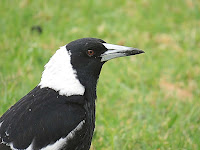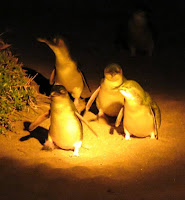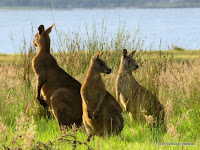Showing posts with label Wildlife. Show all posts
Showing posts with label Wildlife. Show all posts
Swooping Magpies: Surviving the Mad Magpie of Toogoolawah!
10 Australian animals you have never heard of and where to find them.
Think of Australian animals and you might conjure up images of cuddly koalas and cute kangaroos, or perhaps venomous spiders and deadly snakes, but have you ever heard of a quokka, a dugong, a pademelon or an echidna. Alongside their more famous cousins Australia has a plethora of lesser known marsupials and other animals which no-one has ever heard of. They are just as cute, just as interesting and, like all things Australian, just as unique. I have compiled a list of my favourites with a few hints on where you might find them in the bush.
Location:
Australia
The Little Penguins of Low Head
It is just after 9 pm. David and I are huddled together at Low Head Coastal Reserve in Northern Tasmania, waiting for the sun to set and trying to gain some protection from the gale-force winds. We are here to see little penguins - sometimes called 'fairy penguins' or 'little blue penguins'. They are timid little creatures and won't come ashore until it is almost dark.
We could have come yesterday. Yesterday was a warm, balmy, windless summer's evening. We could have come tomorrow. Tomorrow will be a warm, balmy, windless summer's evening. We have chosen tonight, for no good reason I can think of. Tonight is cold, very cold, and the wind is whipping through our inadequate summer jackets, making us wonder whether this was a good idea at all.
Where to look for platypus in Tasmania.
After more than an hour walking along the river bank path in Deloraine, stopping every few metres to scan the surface of the water, even I was ready to give up. This was platypus country and we were here in search of one of Australia's most elusive creatures. The platypus is an egg-laying mammal. Along with echidnas it is the only mammal still in existence which lays eggs instead of suckling its young. It has a bill like a duck, a tail which looks like a beaver's tail and the male platypus has a spur poisonous enough to cause severe pain in a human being. The platypus is one of the most unusual looking animals on the planet. It is also cute - seriously cute.
The White Wallabies of Bruny Island.
The 17 best places to see Australian animals in the bush!
According to the Australian Wildlife Society there are 50-60 million kangaroos in Australia. With a population that large they should be easy to find, but they aren't - at least not always. Like other Australian animals they can be remarkably elusive. A fellow blogger recently spent two weeks here, mostly outside the big cities, and didn't see a single kangaroo in the bush. I don't want that to happen to you so I have drawn on the resources of a group of pretty savvy travel bloggers to put together this guide on the best places in the bush to see Australia's unique animals.
I have grouped the suggestions by state and added my own picks at the end of this post.
I have grouped the suggestions by state and added my own picks at the end of this post.
Location:
Australia
Raymond Island, Victoria
I admit it - I am a wildlife tragic. I'll go almost anywhere to see animals in the bush. David and I first visited Raymond Island in March but we were drawn back on the way home from our last road trip. Only four hours drive from Melbourne, at last count the 7.6 sq km island had a koala population of 307, making it the best place in Australia to see koalas in their natural environment.
The island is a two-minute ferry ride from Paynesville in the Gippsland Lakes District of Victoria - a reliable place to see kangaroos. Paynesville and Raymond Island are the perfect wildlife tragic's double act. You can read where to find the kangaroos at Paynesville by clicking - here. For my March blog post on Raymond Island, with practical information as well as a description of our visit and lots of koala pictures click - here.
The island is a two-minute ferry ride from Paynesville in the Gippsland Lakes District of Victoria - a reliable place to see kangaroos. Paynesville and Raymond Island are the perfect wildlife tragic's double act. You can read where to find the kangaroos at Paynesville by clicking - here. For my March blog post on Raymond Island, with practical information as well as a description of our visit and lots of koala pictures click - here.
Paynesville, Victoria
Paynesville is a scenic little town with an uninspiring name in south-eastern Victoria. Until we visited Raymond Island earlier this year I had never heard of it. Surrounded on three sides by the Gippsland Lakes, it is a boating and fishing heaven.
David doesn't fish - full stop end of story. I think he has traumatic childhood fishing memories - something to do with constantly tangled lines, 5 a.m starts and rough weather on small boats outside Sydney Heads. I have never really gotten to the bottom of it but suffice it to say that one of the world's best fathers could never, ever be enticed to take our sons fishing while they were growing up - no matter how much they pleaded.
David doesn't fish - full stop end of story. I think he has traumatic childhood fishing memories - something to do with constantly tangled lines, 5 a.m starts and rough weather on small boats outside Sydney Heads. I have never really gotten to the bottom of it but suffice it to say that one of the world's best fathers could never, ever be enticed to take our sons fishing while they were growing up - no matter how much they pleaded.
The Murray to the Mountains Rail Trail
Tidbinbilla Nature Reserve, A.C.T - The best place in the world to see a platypus.
In December 2019 several platypuses were evacuated from Tidbinbilla in the face of approaching bushfires and severe drought. They were cared for at Sydney's Taronga Zoo. Three have now been returned to their natural habitat at Tidbinbilla.
My search for the elusive platypus is over. I have finally found the best place in the world to see these shy little creatures and, like the whales we saw in Sydney recently, it turns out they are almost in our own backyard.
Hartley's Crocodile Adventures
"If you look under your seats you will find there are no life vests. The reason is obvious."
Several crocs notice our presence and swim silently toward us. Luckily our boat has a solid, unsinkable feel to it.
Raymond Island, Victoria - the best place to see koalas in the bush.
Raymond Island is a small island in the Gippsland Lakes District of Victoria. It is 7.6 sq km and has a population of about 550 people. The only access is by boat or car ferry. In 1953, 42 koalas were re-located there from Phillip Island as part of a conservation program. They took to their new home so well that today their numbers must be managed to prevent over-population. At last count, in 2013, there were 307.
Yesterday we visited Raymond Island. I was in koala heaven. Without a doubt this is the best place I have ever found to see koalas in the bush - and I feel like I have spent half my life looking. The only other places which come close are a few of the campgrounds along The Great Ocean Road.
Yesterday we visited Raymond Island. I was in koala heaven. Without a doubt this is the best place I have ever found to see koalas in the bush - and I feel like I have spent half my life looking. The only other places which come close are a few of the campgrounds along The Great Ocean Road.
Griffith, Narrandera, koalas and the destruction of David's bike (Part 1)
We started the morning innocently enough. We are at Griffith, the first stop on our much delayed trip to Kangaroo Island in South Australia. This is third time lucky territory, if we don't make it this time we will give up forever. Griffith and its neighbours Leeton and Narrandera are the three large towns of the Murrumbidgee Irrigation Area (the 'MIA'). The MIA extends across 1,600,000 acres of land in central New South Wales and has made the area green and fertile - a welcome change from the barren countryside and red dirt of so much of central and western New South Wales. This is one of the most productive agricultural regions in the country contributing billions of dollars to the national economy.With a population of about 17,000, Griffith is the big smoke.
Penguins, dolphins and a petrified forest.
We are on the south coast of the South Island of New Zealand, about three hours drive from Queenstown. This is about as close to Antarctica as NZ gets. Only sparsely populated Stewart Island is closer. Our holiday cabin, one of an isolated group strung out along the beach at Porpoise Bay, just around the headland from Curio Bay, has 180 degree views of the Southern Ocean. We have no internet, mobile phone coverage or television. What we do have is penguins, dolphins, seals, a petrified forest and, much to David’s irritation, sand flies.
Be careful what you wish for!
The kids and I learnt long ago that you have to be careful what you wish for in the Lindfields' household. An unguarded moment spent musing about - say - ' we've never been to Uruguay' - and next thing you know you can find yourself sitting on an aeroplane wishing you'd had more time to brush up on your spanish.
Subscribe to:
Posts (Atom)













